Charles Sturt University: Driverless Trucks and Ethical Theories
VerifiedAdded on 2021/06/14
|9
|1730
|51
Report
AI Summary
This report from a Charles Sturt University student explores the ethical issues surrounding the implementation of driverless trucks in Australia, focusing on the potential for job displacement and its broader societal impact. The report delves into various ethical theories, including utilitarianism, deontology, virtue theory, and contract theory, to evaluate the moral and ethical dimensions of this technological advancement. It examines how these theories can be applied to assess the judgments and decisions made by transport business owners, employees, and the government. The analysis considers the ethical implications of self-driving cars, the potential effects on employment rates, and the need for ethical considerations in policy-making. The report also considers what options are available to mitigate ethical concerns and what choices would be the best. The student utilizes ethical frameworks to evaluate the positive and negative consequences of technological changes in the transport industry, ultimately aiming to provide a comprehensive ethical assessment of driverless trucks.
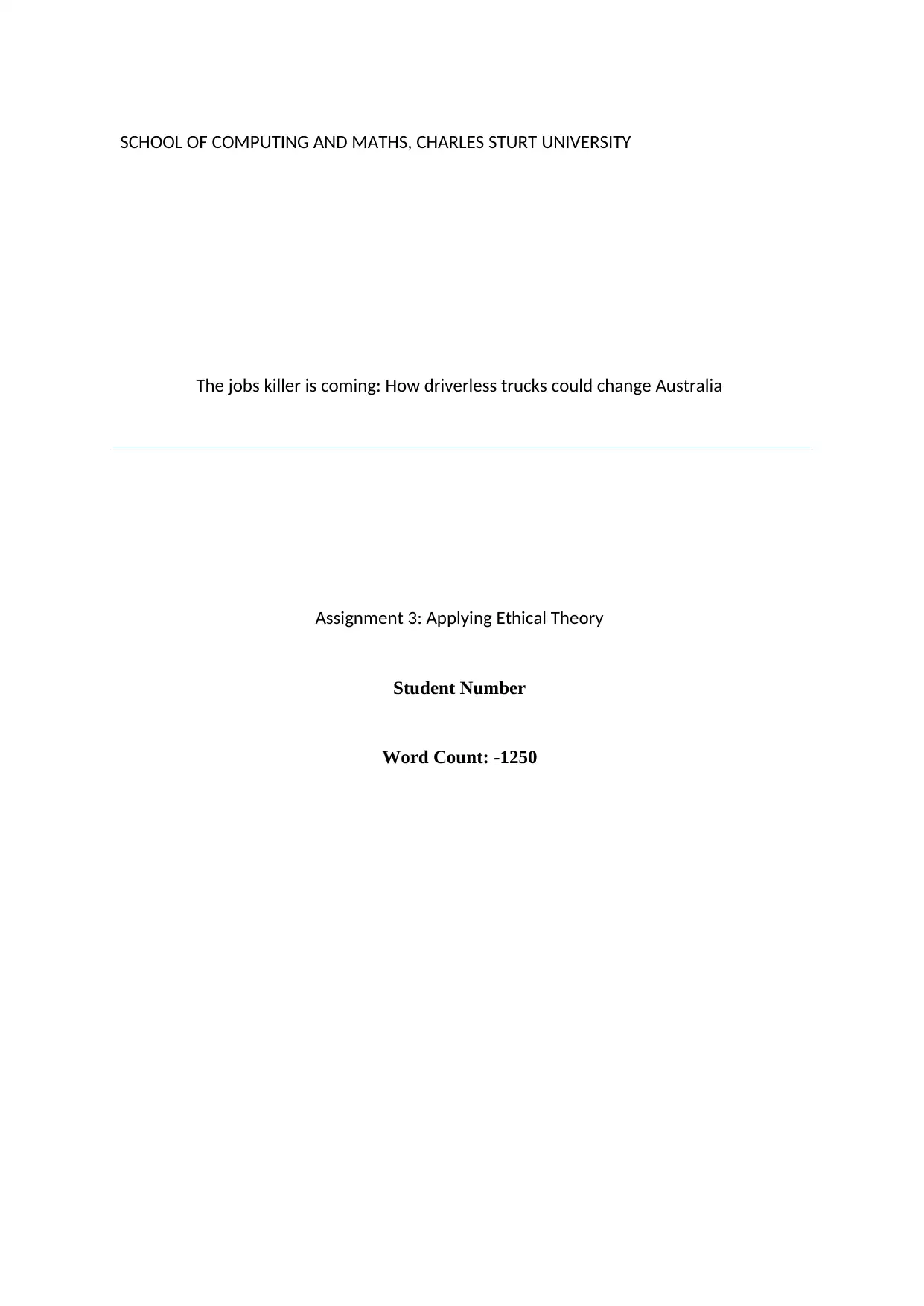
SCHOOL OF COMPUTING AND MATHS, CHARLES STURT UNIVERSITY
The jobs killer is coming: How driverless trucks could change Australia
Assignment 3: Applying Ethical Theory
Student Number
Word Count: -1250
The jobs killer is coming: How driverless trucks could change Australia
Assignment 3: Applying Ethical Theory
Student Number
Word Count: -1250
Paraphrase This Document
Need a fresh take? Get an instant paraphrase of this document with our AI Paraphraser
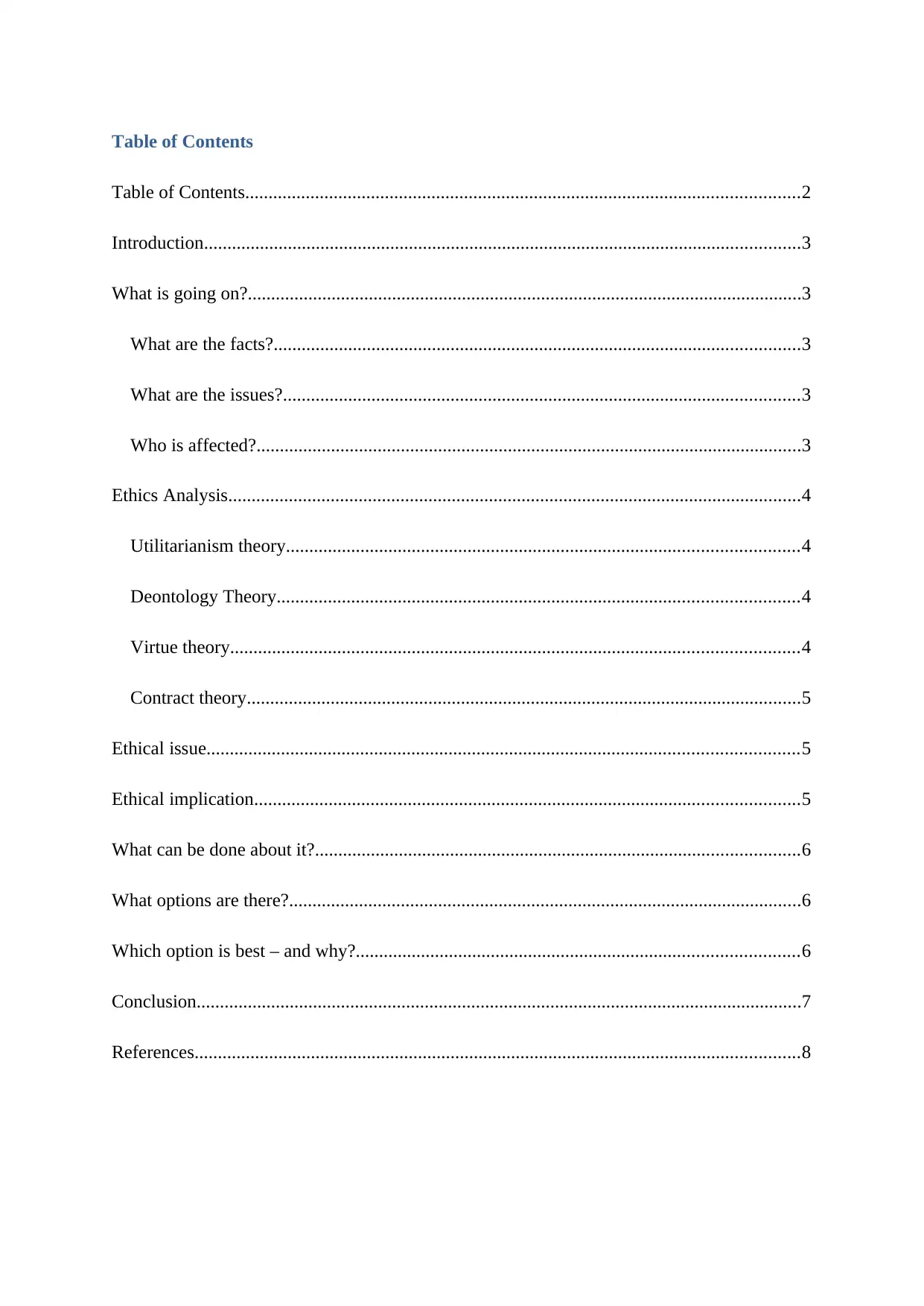
Table of Contents
Table of Contents.......................................................................................................................2
Introduction................................................................................................................................3
What is going on?.......................................................................................................................3
What are the facts?.................................................................................................................3
What are the issues?...............................................................................................................3
Who is affected?.....................................................................................................................3
Ethics Analysis...........................................................................................................................4
Utilitarianism theory..............................................................................................................4
Deontology Theory................................................................................................................4
Virtue theory..........................................................................................................................4
Contract theory.......................................................................................................................5
Ethical issue...............................................................................................................................5
Ethical implication.....................................................................................................................5
What can be done about it?........................................................................................................6
What options are there?..............................................................................................................6
Which option is best – and why?...............................................................................................6
Conclusion..................................................................................................................................7
References..................................................................................................................................8
Table of Contents.......................................................................................................................2
Introduction................................................................................................................................3
What is going on?.......................................................................................................................3
What are the facts?.................................................................................................................3
What are the issues?...............................................................................................................3
Who is affected?.....................................................................................................................3
Ethics Analysis...........................................................................................................................4
Utilitarianism theory..............................................................................................................4
Deontology Theory................................................................................................................4
Virtue theory..........................................................................................................................4
Contract theory.......................................................................................................................5
Ethical issue...............................................................................................................................5
Ethical implication.....................................................................................................................5
What can be done about it?........................................................................................................6
What options are there?..............................................................................................................6
Which option is best – and why?...............................................................................................6
Conclusion..................................................................................................................................7
References..................................................................................................................................8
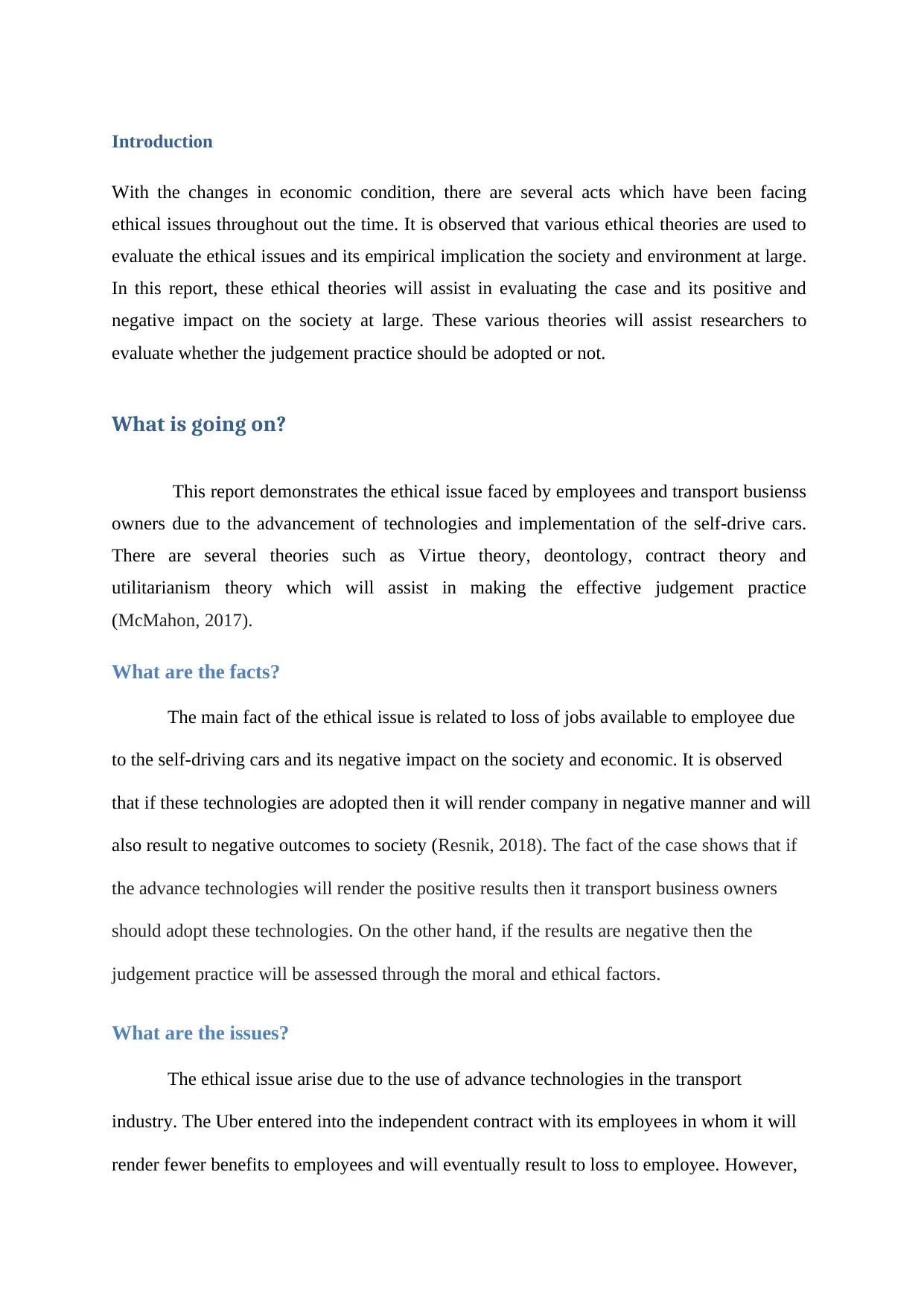
Introduction
With the changes in economic condition, there are several acts which have been facing
ethical issues throughout out the time. It is observed that various ethical theories are used to
evaluate the ethical issues and its empirical implication the society and environment at large.
In this report, these ethical theories will assist in evaluating the case and its positive and
negative impact on the society at large. These various theories will assist researchers to
evaluate whether the judgement practice should be adopted or not.
What is going on?
This report demonstrates the ethical issue faced by employees and transport busienss
owners due to the advancement of technologies and implementation of the self-drive cars.
There are several theories such as Virtue theory, deontology, contract theory and
utilitarianism theory which will assist in making the effective judgement practice
(McMahon, 2017).
What are the facts?
The main fact of the ethical issue is related to loss of jobs available to employee due
to the self-driving cars and its negative impact on the society and economic. It is observed
that if these technologies are adopted then it will render company in negative manner and will
also result to negative outcomes to society (Resnik, 2018). The fact of the case shows that if
the advance technologies will render the positive results then it transport business owners
should adopt these technologies. On the other hand, if the results are negative then the
judgement practice will be assessed through the moral and ethical factors.
What are the issues?
The ethical issue arise due to the use of advance technologies in the transport
industry. The Uber entered into the independent contract with its employees in whom it will
render fewer benefits to employees and will eventually result to loss to employee. However,
With the changes in economic condition, there are several acts which have been facing
ethical issues throughout out the time. It is observed that various ethical theories are used to
evaluate the ethical issues and its empirical implication the society and environment at large.
In this report, these ethical theories will assist in evaluating the case and its positive and
negative impact on the society at large. These various theories will assist researchers to
evaluate whether the judgement practice should be adopted or not.
What is going on?
This report demonstrates the ethical issue faced by employees and transport busienss
owners due to the advancement of technologies and implementation of the self-drive cars.
There are several theories such as Virtue theory, deontology, contract theory and
utilitarianism theory which will assist in making the effective judgement practice
(McMahon, 2017).
What are the facts?
The main fact of the ethical issue is related to loss of jobs available to employee due
to the self-driving cars and its negative impact on the society and economic. It is observed
that if these technologies are adopted then it will render company in negative manner and will
also result to negative outcomes to society (Resnik, 2018). The fact of the case shows that if
the advance technologies will render the positive results then it transport business owners
should adopt these technologies. On the other hand, if the results are negative then the
judgement practice will be assessed through the moral and ethical factors.
What are the issues?
The ethical issue arise due to the use of advance technologies in the transport
industry. The Uber entered into the independent contract with its employees in whom it will
render fewer benefits to employees and will eventually result to loss to employee. However,
⊘ This is a preview!⊘
Do you want full access?
Subscribe today to unlock all pages.

Trusted by 1+ million students worldwide
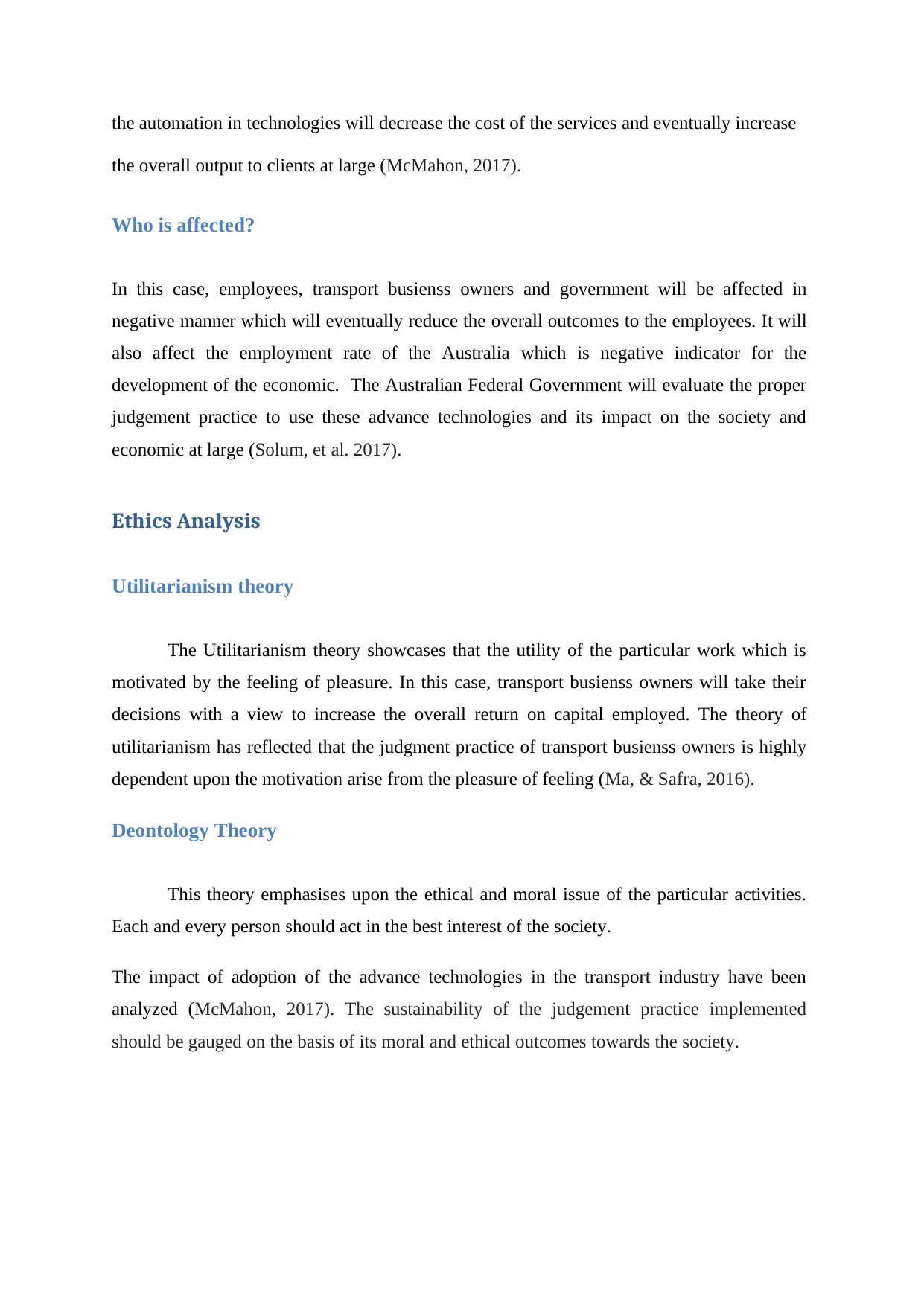
the automation in technologies will decrease the cost of the services and eventually increase
the overall output to clients at large (McMahon, 2017).
Who is affected?
In this case, employees, transport busienss owners and government will be affected in
negative manner which will eventually reduce the overall outcomes to the employees. It will
also affect the employment rate of the Australia which is negative indicator for the
development of the economic. The Australian Federal Government will evaluate the proper
judgement practice to use these advance technologies and its impact on the society and
economic at large (Solum, et al. 2017).
Ethics Analysis
Utilitarianism theory
The Utilitarianism theory showcases that the utility of the particular work which is
motivated by the feeling of pleasure. In this case, transport busienss owners will take their
decisions with a view to increase the overall return on capital employed. The theory of
utilitarianism has reflected that the judgment practice of transport busienss owners is highly
dependent upon the motivation arise from the pleasure of feeling (Ma, & Safra, 2016).
Deontology Theory
This theory emphasises upon the ethical and moral issue of the particular activities.
Each and every person should act in the best interest of the society.
The impact of adoption of the advance technologies in the transport industry have been
analyzed (McMahon, 2017). The sustainability of the judgement practice implemented
should be gauged on the basis of its moral and ethical outcomes towards the society.
the overall output to clients at large (McMahon, 2017).
Who is affected?
In this case, employees, transport busienss owners and government will be affected in
negative manner which will eventually reduce the overall outcomes to the employees. It will
also affect the employment rate of the Australia which is negative indicator for the
development of the economic. The Australian Federal Government will evaluate the proper
judgement practice to use these advance technologies and its impact on the society and
economic at large (Solum, et al. 2017).
Ethics Analysis
Utilitarianism theory
The Utilitarianism theory showcases that the utility of the particular work which is
motivated by the feeling of pleasure. In this case, transport busienss owners will take their
decisions with a view to increase the overall return on capital employed. The theory of
utilitarianism has reflected that the judgment practice of transport busienss owners is highly
dependent upon the motivation arise from the pleasure of feeling (Ma, & Safra, 2016).
Deontology Theory
This theory emphasises upon the ethical and moral issue of the particular activities.
Each and every person should act in the best interest of the society.
The impact of adoption of the advance technologies in the transport industry have been
analyzed (McMahon, 2017). The sustainability of the judgement practice implemented
should be gauged on the basis of its moral and ethical outcomes towards the society.
Paraphrase This Document
Need a fresh take? Get an instant paraphrase of this document with our AI Paraphraser
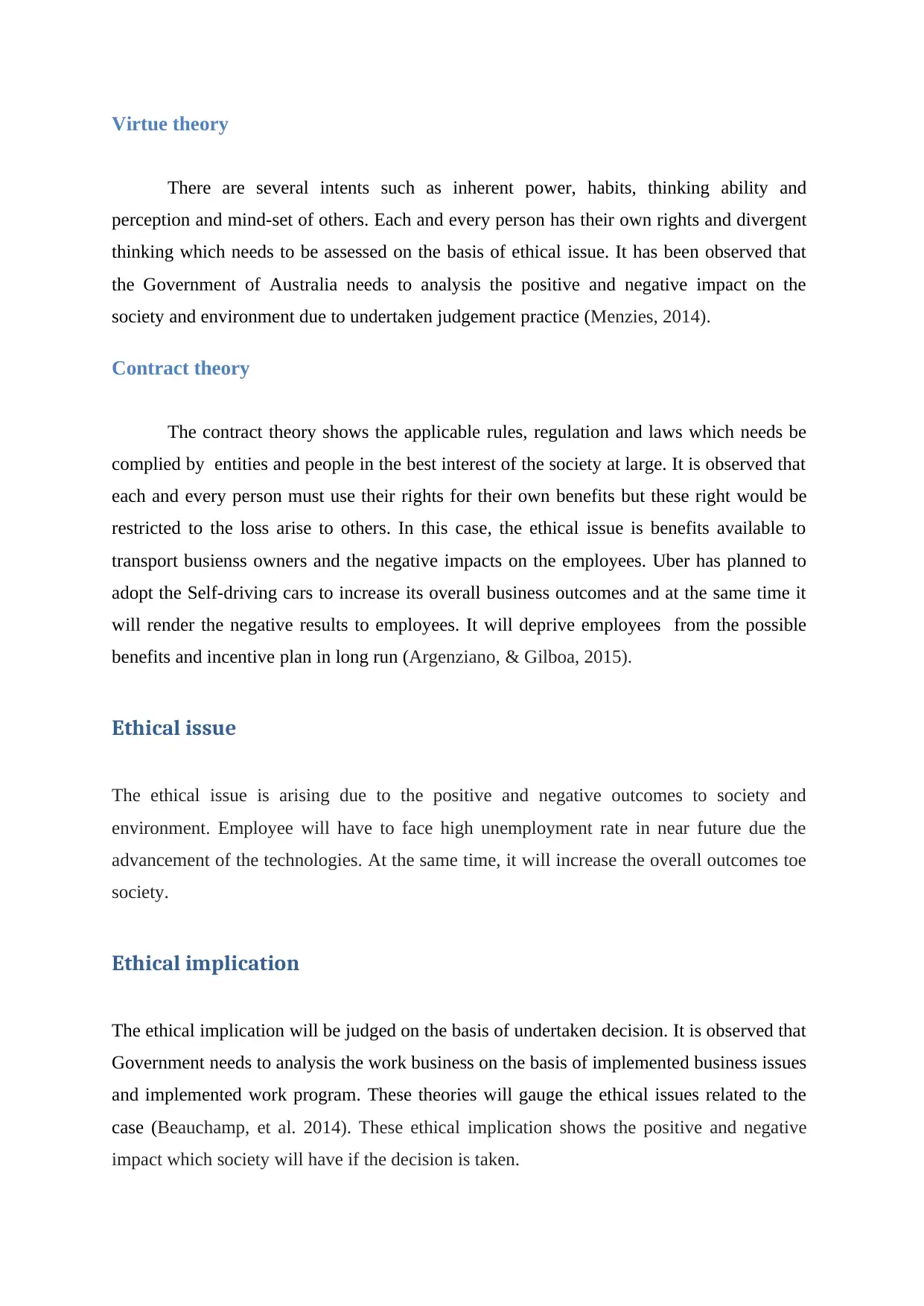
Virtue theory
There are several intents such as inherent power, habits, thinking ability and
perception and mind-set of others. Each and every person has their own rights and divergent
thinking which needs to be assessed on the basis of ethical issue. It has been observed that
the Government of Australia needs to analysis the positive and negative impact on the
society and environment due to undertaken judgement practice (Menzies, 2014).
Contract theory
The contract theory shows the applicable rules, regulation and laws which needs be
complied by entities and people in the best interest of the society at large. It is observed that
each and every person must use their rights for their own benefits but these right would be
restricted to the loss arise to others. In this case, the ethical issue is benefits available to
transport busienss owners and the negative impacts on the employees. Uber has planned to
adopt the Self-driving cars to increase its overall business outcomes and at the same time it
will render the negative results to employees. It will deprive employees from the possible
benefits and incentive plan in long run (Argenziano, & Gilboa, 2015).
Ethical issue
The ethical issue is arising due to the positive and negative outcomes to society and
environment. Employee will have to face high unemployment rate in near future due the
advancement of the technologies. At the same time, it will increase the overall outcomes toe
society.
Ethical implication
The ethical implication will be judged on the basis of undertaken decision. It is observed that
Government needs to analysis the work business on the basis of implemented business issues
and implemented work program. These theories will gauge the ethical issues related to the
case (Beauchamp, et al. 2014). These ethical implication shows the positive and negative
impact which society will have if the decision is taken.
There are several intents such as inherent power, habits, thinking ability and
perception and mind-set of others. Each and every person has their own rights and divergent
thinking which needs to be assessed on the basis of ethical issue. It has been observed that
the Government of Australia needs to analysis the positive and negative impact on the
society and environment due to undertaken judgement practice (Menzies, 2014).
Contract theory
The contract theory shows the applicable rules, regulation and laws which needs be
complied by entities and people in the best interest of the society at large. It is observed that
each and every person must use their rights for their own benefits but these right would be
restricted to the loss arise to others. In this case, the ethical issue is benefits available to
transport busienss owners and the negative impacts on the employees. Uber has planned to
adopt the Self-driving cars to increase its overall business outcomes and at the same time it
will render the negative results to employees. It will deprive employees from the possible
benefits and incentive plan in long run (Argenziano, & Gilboa, 2015).
Ethical issue
The ethical issue is arising due to the positive and negative outcomes to society and
environment. Employee will have to face high unemployment rate in near future due the
advancement of the technologies. At the same time, it will increase the overall outcomes toe
society.
Ethical implication
The ethical implication will be judged on the basis of undertaken decision. It is observed that
Government needs to analysis the work business on the basis of implemented business issues
and implemented work program. These theories will gauge the ethical issues related to the
case (Beauchamp, et al. 2014). These ethical implication shows the positive and negative
impact which society will have if the decision is taken.
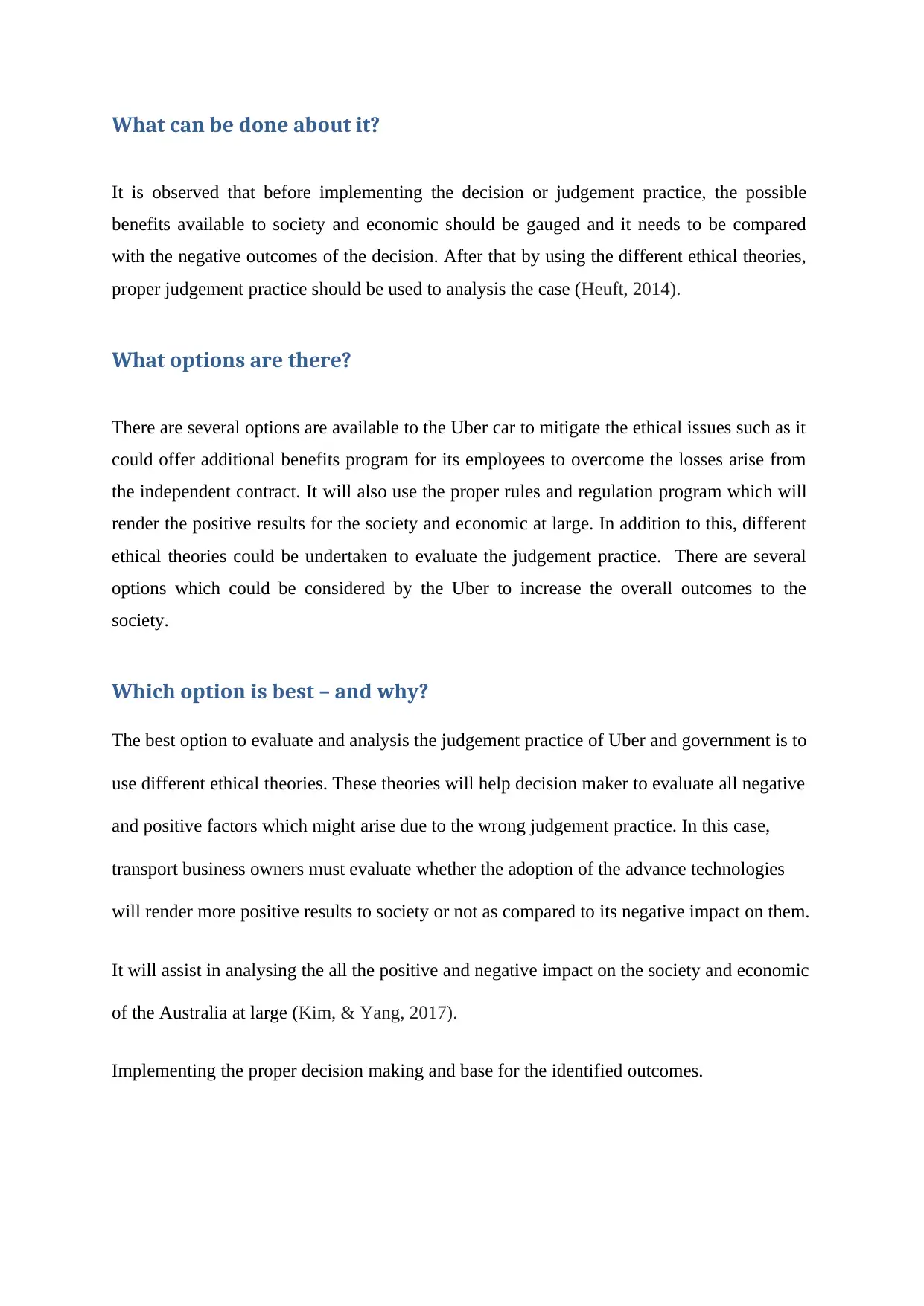
What can be done about it?
It is observed that before implementing the decision or judgement practice, the possible
benefits available to society and economic should be gauged and it needs to be compared
with the negative outcomes of the decision. After that by using the different ethical theories,
proper judgement practice should be used to analysis the case (Heuft, 2014).
What options are there?
There are several options are available to the Uber car to mitigate the ethical issues such as it
could offer additional benefits program for its employees to overcome the losses arise from
the independent contract. It will also use the proper rules and regulation program which will
render the positive results for the society and economic at large. In addition to this, different
ethical theories could be undertaken to evaluate the judgement practice. There are several
options which could be considered by the Uber to increase the overall outcomes to the
society.
Which option is best – and why?
The best option to evaluate and analysis the judgement practice of Uber and government is to
use different ethical theories. These theories will help decision maker to evaluate all negative
and positive factors which might arise due to the wrong judgement practice. In this case,
transport business owners must evaluate whether the adoption of the advance technologies
will render more positive results to society or not as compared to its negative impact on them.
It will assist in analysing the all the positive and negative impact on the society and economic
of the Australia at large (Kim, & Yang, 2017).
Implementing the proper decision making and base for the identified outcomes.
It is observed that before implementing the decision or judgement practice, the possible
benefits available to society and economic should be gauged and it needs to be compared
with the negative outcomes of the decision. After that by using the different ethical theories,
proper judgement practice should be used to analysis the case (Heuft, 2014).
What options are there?
There are several options are available to the Uber car to mitigate the ethical issues such as it
could offer additional benefits program for its employees to overcome the losses arise from
the independent contract. It will also use the proper rules and regulation program which will
render the positive results for the society and economic at large. In addition to this, different
ethical theories could be undertaken to evaluate the judgement practice. There are several
options which could be considered by the Uber to increase the overall outcomes to the
society.
Which option is best – and why?
The best option to evaluate and analysis the judgement practice of Uber and government is to
use different ethical theories. These theories will help decision maker to evaluate all negative
and positive factors which might arise due to the wrong judgement practice. In this case,
transport business owners must evaluate whether the adoption of the advance technologies
will render more positive results to society or not as compared to its negative impact on them.
It will assist in analysing the all the positive and negative impact on the society and economic
of the Australia at large (Kim, & Yang, 2017).
Implementing the proper decision making and base for the identified outcomes.
⊘ This is a preview!⊘
Do you want full access?
Subscribe today to unlock all pages.

Trusted by 1+ million students worldwide

Paraphrase This Document
Need a fresh take? Get an instant paraphrase of this document with our AI Paraphraser
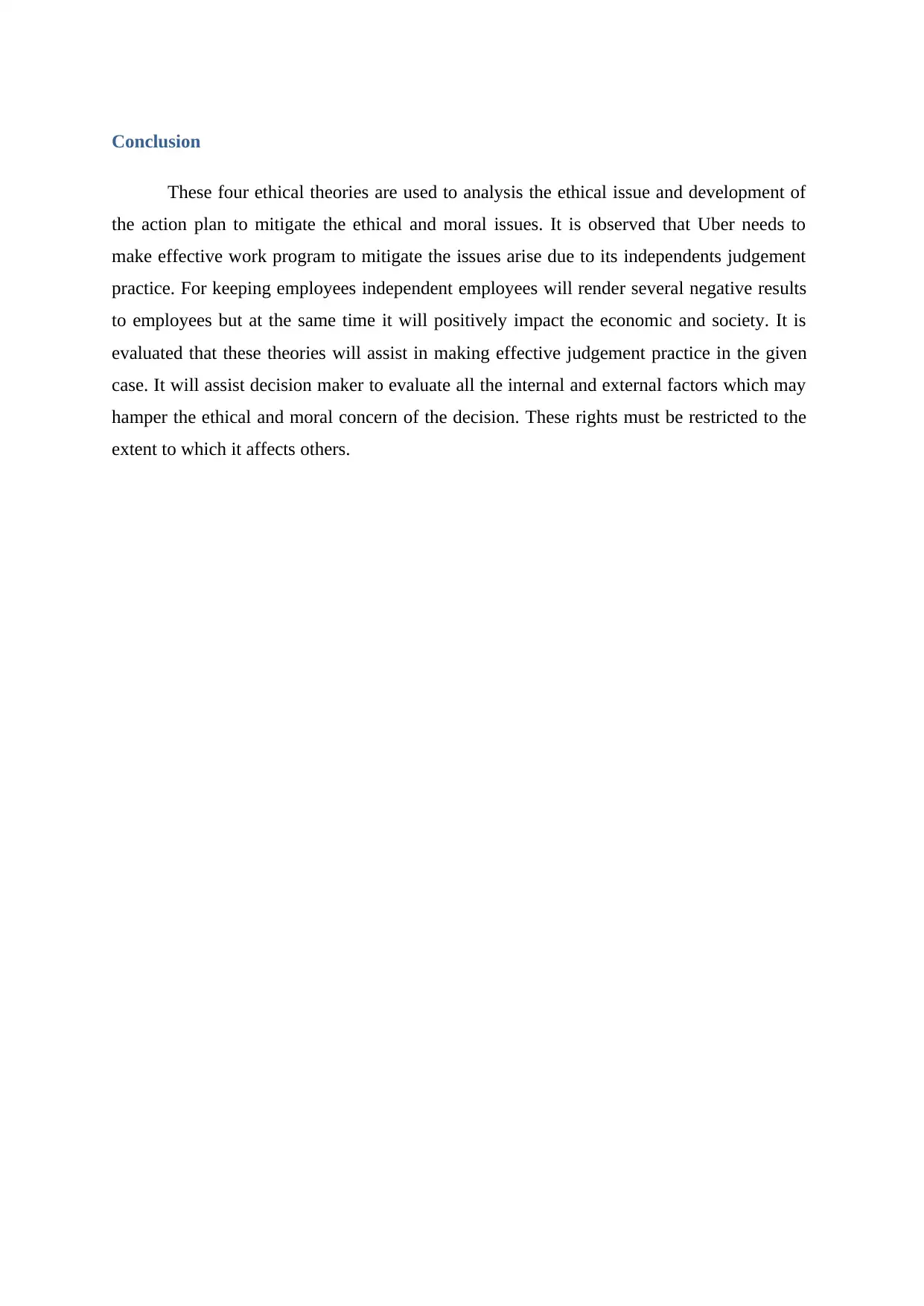
Conclusion
These four ethical theories are used to analysis the ethical issue and development of
the action plan to mitigate the ethical and moral issues. It is observed that Uber needs to
make effective work program to mitigate the issues arise due to its independents judgement
practice. For keeping employees independent employees will render several negative results
to employees but at the same time it will positively impact the economic and society. It is
evaluated that these theories will assist in making effective judgement practice in the given
case. It will assist decision maker to evaluate all the internal and external factors which may
hamper the ethical and moral concern of the decision. These rights must be restricted to the
extent to which it affects others.
These four ethical theories are used to analysis the ethical issue and development of
the action plan to mitigate the ethical and moral issues. It is observed that Uber needs to
make effective work program to mitigate the issues arise due to its independents judgement
practice. For keeping employees independent employees will render several negative results
to employees but at the same time it will positively impact the economic and society. It is
evaluated that these theories will assist in making effective judgement practice in the given
case. It will assist decision maker to evaluate all the internal and external factors which may
hamper the ethical and moral concern of the decision. These rights must be restricted to the
extent to which it affects others.
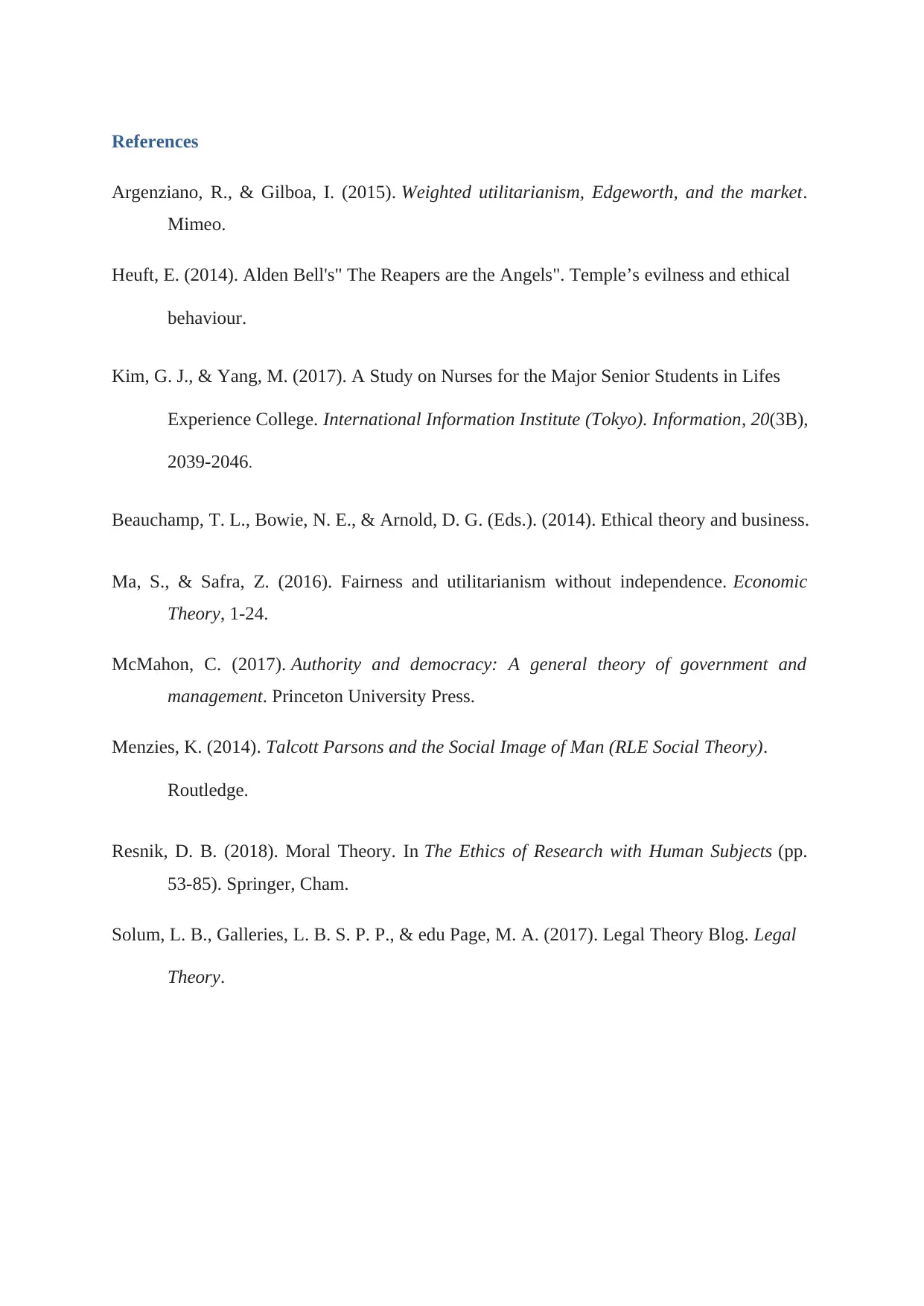
References
Argenziano, R., & Gilboa, I. (2015). Weighted utilitarianism, Edgeworth, and the market.
Mimeo.
Heuft, E. (2014). Alden Bell's" The Reapers are the Angels". Temple’s evilness and ethical
behaviour.
Kim, G. J., & Yang, M. (2017). A Study on Nurses for the Major Senior Students in Lifes
Experience College. International Information Institute (Tokyo). Information, 20(3B),
2039-2046.
Beauchamp, T. L., Bowie, N. E., & Arnold, D. G. (Eds.). (2014). Ethical theory and business.
Ma, S., & Safra, Z. (2016). Fairness and utilitarianism without independence. Economic
Theory, 1-24.
McMahon, C. (2017). Authority and democracy: A general theory of government and
management. Princeton University Press.
Menzies, K. (2014). Talcott Parsons and the Social Image of Man (RLE Social Theory).
Routledge.
Resnik, D. B. (2018). Moral Theory. In The Ethics of Research with Human Subjects (pp.
53-85). Springer, Cham.
Solum, L. B., Galleries, L. B. S. P. P., & edu Page, M. A. (2017). Legal Theory Blog. Legal
Theory.
Argenziano, R., & Gilboa, I. (2015). Weighted utilitarianism, Edgeworth, and the market.
Mimeo.
Heuft, E. (2014). Alden Bell's" The Reapers are the Angels". Temple’s evilness and ethical
behaviour.
Kim, G. J., & Yang, M. (2017). A Study on Nurses for the Major Senior Students in Lifes
Experience College. International Information Institute (Tokyo). Information, 20(3B),
2039-2046.
Beauchamp, T. L., Bowie, N. E., & Arnold, D. G. (Eds.). (2014). Ethical theory and business.
Ma, S., & Safra, Z. (2016). Fairness and utilitarianism without independence. Economic
Theory, 1-24.
McMahon, C. (2017). Authority and democracy: A general theory of government and
management. Princeton University Press.
Menzies, K. (2014). Talcott Parsons and the Social Image of Man (RLE Social Theory).
Routledge.
Resnik, D. B. (2018). Moral Theory. In The Ethics of Research with Human Subjects (pp.
53-85). Springer, Cham.
Solum, L. B., Galleries, L. B. S. P. P., & edu Page, M. A. (2017). Legal Theory Blog. Legal
Theory.
⊘ This is a preview!⊘
Do you want full access?
Subscribe today to unlock all pages.

Trusted by 1+ million students worldwide
1 out of 9
Related Documents
Your All-in-One AI-Powered Toolkit for Academic Success.
+13062052269
info@desklib.com
Available 24*7 on WhatsApp / Email
![[object Object]](/_next/static/media/star-bottom.7253800d.svg)
Unlock your academic potential
Copyright © 2020–2026 A2Z Services. All Rights Reserved. Developed and managed by ZUCOL.





